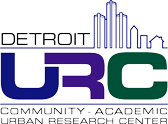CBPR Partnership Academy
![]() Today’s complex public health problems demand a collaborative, engaged research approach, whereby those most impacted by health inequities have a genuine “voice” in pursuing solutions.
Today’s complex public health problems demand a collaborative, engaged research approach, whereby those most impacted by health inequities have a genuine “voice” in pursuing solutions.
Community-based participatory research (CBPR) is widely recognized as an effective approach for understanding and addressing health inequities—and for giving communities an equitable stake in the process of doing so. The Detroit Urban Research Center established the CBPR Partnership Academy to support the increased use of a CBPR approach by developing enhanced skills and knowledge of community-academic research teams.
Funded by the National Institutes of Health, the CBPR Partnership Academy is a multi-faceted training and mentoring program designed for new community-academic partnerships that are interested in exploring and engaging in a CBPR approach to eliminate health inequities in their communities. Three academy cohorts completed the program between 2015 and 2018, and an additional year of funding provided an opportunity for all three cohorts to extend their participation. Click here to read about the extension of the CBPR Partnership Academy.
Academy opportunities and program components have been as follows:
- Week-long intensive course at the University of Michigan in Ann Arbor, MI;
- Monthly learning activities (e.g., webinars, mentoring calls, and online forums) during the one-year program period;
- Non-competitive grant proposal writing and funding opportunity; and
- National CBPR Partnership Academy Network (to engage in group discussions, share ideas, resources, and provide feedback).
In each cohort, a total of 12, two-person teams were selected for the CBPR Partnership Academy through a competitive review process (click here for past eligibility requirements). All program expenses were covered for participants, including tuition, travel, meals, lodging, materials, and ongoing learning activities. Those selected for the Partnership Academy worked in pairs of one community member and one academic researcher.
Teams who participated in the Academy came away with enhanced capabilities, knowledge, and skills for creating, implementing, and maintaining a successful CBPR partnership using innovative methods in the behavioral and social sciences to make a positive difference in the health and well-being of their local populations.
The 72 participants were pairs of one community and one academic partner new to CBPR. Participants reflected multiple dimensions of diversity, including 18 states and 2 tribal nations, 2/3 from racial and ethnic groups underrepresented in research, multiple disciplines, and 81% of the researchers were women. Accomplishments of partnerships included: grants funded; research studies conducted; and dissemination through presentations, publications, workshops, and courses.
“More people are coming to us and asking how to do CBPR, how to find a partner… People are excited by the approach and recognize that it brings something unique to the work that we’re trying to do.” ~ Community partner
Promoting CBPR to Achieve Health Equity: The CBPR Partnership Academy Symposium
In May of 2019,the Detroit Urban Research Center (Detroit URC) was delighted to host a one-and-a-half day Symposium featuring participants in the CBPR Partnership Academy Network of Scholars. The Symposium, titled “Promoting Community-Based Participatory Research to Achieve Health Equity,” was held at U-M’s Detroit Center.
The Symposium highlighted the work of Partnership Academy participants. Utilizing panel presentations, lightning talks, and poster presentations, teams shared their accomplishments and strategies in developing partnerships and implementing a wide range of CBPR projects - from designing culturally-grounded wellness programs to using digital storytelling to amplify community voices. In addition to formal opportunities to discuss issues and learn from each other in small groups, there were ample opportunities for networking and informal conversations. Keynote speakers included Al Richmond , MSW, CCPH, Executive Director, Community Campus Partnerships for Health , founding member and past chair of the Community-Based Public Health Caucus and the National Community Based Organization Network and Abdul El-Sayed, MD, PhD, Rhodes Scholar, physician, epidemiologist, public health expert, and progressive activist.
Click here for a PDF of the event program.
Please see photos and profiles of selected teams below.
 |
 |
 |
||
Additional Program Information:
- Eligibility & Application Requirements
- Core Curriculum
- Participant Testimonials (YouTube Video Clips)
- CBPR Partnership Academy Instructors & Mentors
- CBPR Partnership Academy Resources
Publications, Presentations, & Posters:
- Article: Results From the CBPR Partnership Academy
- Article: Experiential Action Learning Pedagogy to Enhance CBPR (2019)
- Coombe, C.M., Schulz, A.J., Brakefield-Caldwell, W., Gray, C., Guzman, J.R., Kieffer, E., Lewis, T., Reyes, A.G., Rowe, Z., Israel, B.A. (In press). Applying experiential action learning pedagogy to enhance community-academic partnerships: A weeklong intensive course in CBPR. Pedagogy in Health Promotion.
- American Public Health Association Annual Meeting Presentations, Panels, and Posters
- 2019
- 2018
- 2017
- Capacity building to foster the development of community-university partnerships: lessons learned from the CBPR Partnership Academy
- Capacity building for developing equal community-academic partnerships: The community-based participatory research (CBPR) partnership academy
- Building community capacity to address health equity in Tacoma WA: Lessons learned from an academic-public health community-based participatory research partnership
- Establishing a community steering committee through a community-based participatory approach: Lessons learned from the FAITH! (Fostering African-American Improvement in Total Health) program
- Results from a process and impact evaluation of the CBPR Partnership Academy: Lessons learned for developing community-academic partnerships for health and equity
- Capacity building to foster the development of community-university partnerships: lessons learned from the CBPR Partnership Academy
- 2016
- 2015
CBPR: Enhancing Capacity to Use Innovative Methodologies in the Behavioral and Social Sciences (the Enhance Program) is funded by the National Institute of General Medical Sciences of the National Institutes of Health under Award #1R25GM111837-01. Related materials do not necessarily represent views of NIH.



